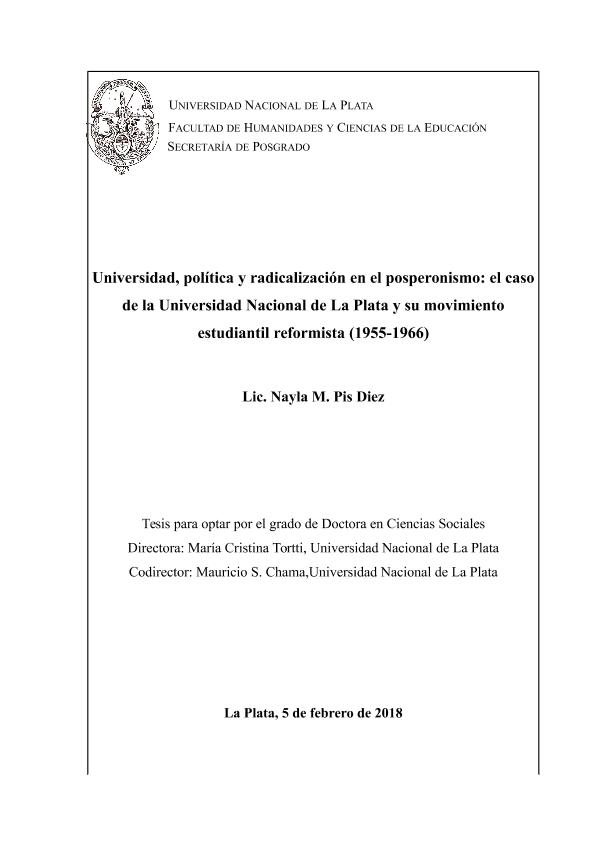Tesis doctoral
Esta tesis tiene por tema los tempranos procesos de politización que tuvieron lugar en el seno del movimiento estudiantil de la Universidad Nacional de La Plata, en el período que transcurre entre los años 1955 y 1966. En términos generales, dicho período estuvo signado por la convergencia entre el agotamiento del modelo de acumulación de industrialización por sustitución de importaciones y una fuerte crisis de legitimidad del sistema político, sus instituciones y reglas generales. El creciente descontento social y la influencia de la Revolución Cubana provocaron intensos debates y reorientaciones en el campo de las izquierdas, el catolicismo y el peronismo; también en el reformismo universitario, núcleo central de la identidad política del estudiantado argentino. Al mismo tiempo, la imbricación entre la política y las diversas esferas de la vida social, la politización de estas y la radicalización de la primera, marcaron el tono de aquellos debates. La forma como el movimiento estudiantil articuló la lucha gremial, la identidad reformista y sus posiciones políticas y adscripciones partidarias es el problema central de este trabajo. Dado este marco, se indagaron desplazamientos, posiciones disidentes y rupturas hacia la izquierda respecto del “sentido común” reformista vigente en 1955. Tales rupturas marcan los tres momentos que organizan este trabajo: 1956/1957, con el surgimiento del “frondizismo universitario” y la corriente reformista de izquierdas; 1959 con la radicalización de diversos núcleos de dicha corriente y su desplazamiento hacia el comunismo, la “nueva izquierda” o el trotskismo; 1964/1965, donde ubicamos la articulación entre novedosos grupos de izquierda y núcleos peronistas. El origen y desarrollo de esas disidencias se analizó en una doble dimensión. Una ideológica u identitaria, que buscó dar cuenta de los cuestionamientos a la identidad reformista y/o las resignificaciones de la misma. Otra político organizativa, que analizó la creación de nuevas corrientes y agrupaciones, sus posiciones en el mapa reformista, así como también las formas de relacionar la militancia universitaria con la política partidaria. This thesis takes as a topic the early processes of politicization that took place in the bosom of the student movement of the Universidad Nacional de La Plata, in the period that passes between the year 1955 and 1966. In general terms, the above mentioned period was sealed by the convergence between the depletion of the model of accumulation of industrialization by substitution of imports and a strong crisis of legitimacy of the political system, its institutions and general rules. The increasing social discontent and the influence of the Cuban Revolution provoked intense disscusions and reorientations in the left sides, the catholicism and the Peronism; also in the university reformism, central part of the political identity of the Argentine student body. At the same time, the overlap between the politics and the varius spheres of social life, the politization of these and the radicalization of the first one, they marked the tone of those debates. The way in wich the student movement articulated the trade-union fight, the identity reformist and its political positions and adscriptions partial is the central problem of this essay. In this framework, there were investigated displacements that were translated in dissident positions and breaks towards the left respect of the common sense during 1955. Such breaks mark three moments that organize this work: 1956/1957, with the emergence of "frondizismo universitario" and the current reformist of left sides; 1959 with the radicalization of diverse cores of the above mentioned current and its displacement towards the communism, the "new left side" or the trotskism; 1964/1965, where we locate the joint between new groups of left side and Peronist cores. The origin and development of these dissents was analyzed in a double dimension. The ideological one, that it sought to realize from the questions to the identity reformist and/or the resignificances of the same one. Other one politician organizational, analyzed the creation of new political currents and groups, its positions in the map, as well as also the ways of relating the university militancy to the party politics.
Universidad, política y radicalización en el posperonismo: el caso de la Universidad Nacional de La Plata y su movimiento estudiantil reformista (1955-1966)
Pis Diez, Nayla María

Director:
Tortti, Maria Cristina
Codirector:
Chama, Mauricio Sergio
Fecha de publicación:
22/03/2018
Idioma:
Español
Clasificación temática:
Resumen
Palabras clave:
Movimiento Estudiantil
,
Politización
,
Nueva Izquierda
,
Peronismo
,
Reformismo
Archivos asociados
Licencia
Identificadores
Colecciones
Tesis(IDIHCS)
Tesis de INST.DE INVEST.EN HUMANIDADES Y CS SOCIALES
Tesis de INST.DE INVEST.EN HUMANIDADES Y CS SOCIALES
Citación
Pis Diez, Nayla María; Tortti, Maria Cristina; Chama, Mauricio Sergio; Universidad, política y radicalización en el posperonismo: el caso de la Universidad Nacional de La Plata y su movimiento estudiantil reformista (1955-1966); 22-3-2018
Compartir
Altmétricas



